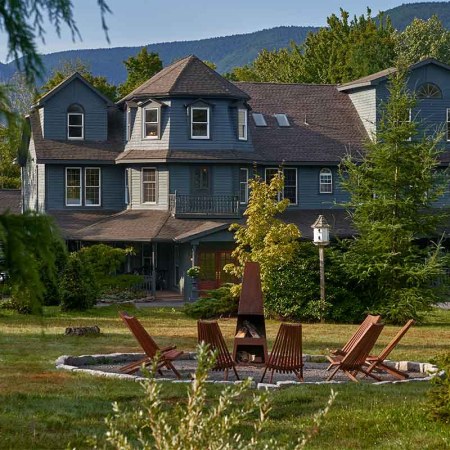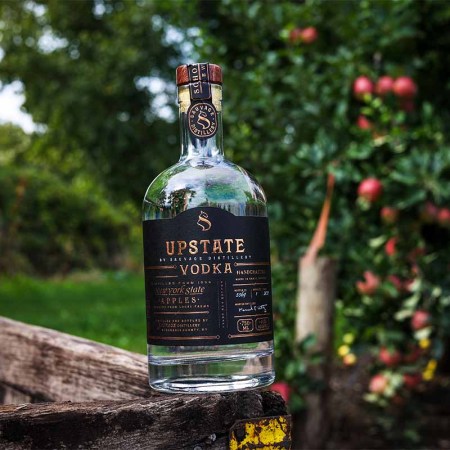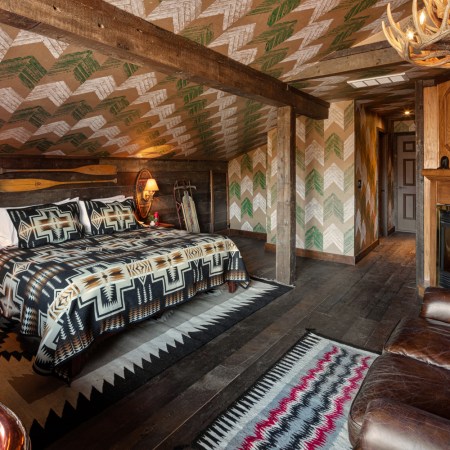For weary New Yorkers, traveling Upstate for a weekend comes with certain expectations: charm will ooze from every wall of their accommodation, craft beverages aplenty will be consumed, and nature will feature prominently in the itinerary.
In response, Seminary Hill has arrived to say: hold my cider. Founded by a husband-and-wife duo with deep familial roots in the area, the multi-hyphenate property has touched town in the arrestingly cozy and bucolic town of Callicoon to provide travelers with both a place to imbibe and a roof under which to take shelter once the optimal levels of sun and cider have been reached.
“We’ve long wanted to create a business in Callicoon,” says co-owner Susan Manning. “One that feels authentic to the region and allows us to spend more time here. With Seminary Hill, we’re reinventing local traditions of cider-making, sustainability and hospitality for the 21st century, while reinvesting in the community that nurtured Doug’s family for five generations.”
Relax in Style
Opening this Friday (June 25) are both Seminary Hill’s Cidery and its adjacent hotel property, called Boarding House. Composed of an Upper House and Lower House, it feels less like a hotel and more like a friend’s stylish home — calling upon locally sourced antiques for a calming Shaker-style vibe thanks to independent design group Homestedt. They’re the same stylish duo that we also have to thank for the Livingston Manor Fly Fishing Club, a bespoke retreat 30 minutes down the road for those dying to cast some lines.
To see what all the fuss was about, my partner and I drove the nearly three hour drive from Brooklyn up to Callicoon, marveling at what a different world Upstate New York always feels like. It’s a fairly long drive through the countryside, so we rented a 2021 Chevy Tahoe — a car with some serious air conditioning power that also provides its own wifi. We definitely suggest you do the same, or at least download your route over to Seminary Hill before heading out of town.

Working with Seminary Hill, Homestedt focused on the restoration of the two 100-plus-year-old buildings, which once served as a local hospital and doctor’s office. Linoleum floors and overhead lighting were stripped away to let simple materials and Scandinavian accents take center stage. Now, the 17 rooms are ready to welcome guests, and can be booked as suites or individual rooms. As one might guess, each room is unique, but the throughline is countryside comfort in the form of cushy Wright mattresses, linen sheets and functioning kitchenettes stocked with Danish appliances, coffee grounds and glass bottles of cold milk.
“For the Boarding House, we wanted to stay true to the spirit of the Western Catskills, while keeping in mind the needs of today’s urban travelers,” says Homestedt co-founder Tom Roberts, who along with partner Anna Aberg, also oversaw branding and visuals for the Cidery.

“We followed the elegant yet simple lines of Shaker design, a style that originated in 19th-century utopian communities in the Northeast, to reflect the region’s humble, hard-working nature, focusing on natural materials, functional design and the luxury of simple, well-made products.”
All of the Views, None of the Chemicals
A short drive down the road you can find yourself at the Orchard and Cidery, where a 3,500-square-foot tasting room, kitchen and events space overlook sloping, grassy grounds lined with more than 1,500 fruit trees. Below that, grand views of the Delaware River as it flows into Pennsylvania.
For co-owner Doug Doetsch, the opening of the Orchard and Cidery felt personally special.
“The concern of my parents and grandparents was that traditional agriculture in Callicoon and Sullivan County was in terminal decline,” he says. “They would be pleased, and surprised, to know that we’ve helped to revitalize the area’s apple and cider industry — one of the most traditional sectors in local agriculture, going back well into the 1800s.”
For Doetsch and Manning it wasn’t just about the agriculture, though, as the two also emphasize that Seminary Hill is the first cidery of its kind certified by Passive House Institute US (PHIUS), meaning that energy consumption there is minimal thanks to efficient heating and cooling, solar panels and a building optimized to take in direct sun during the winter and shade during the summer.

“While in graduate architecture school, I was one of the editors of the school’s journal,” says the property’s cider director, Stuart Madany. “We had our first meeting and all agreed to come back with suggested themes in two weeks. During that time I took a flight, and felt disturbed by the pattern of development stretched out below. At the next meeting, I suggested ‘Stewardship of the Earth,’ as our topic, which, to my surprise, the other editors agreed upon. At that time terms like ‘green building’ and ‘sustainable design’ were not yet in the lexicon.”
“A few months back, I was actually planning a return to architecture when I happened upon the ad for a cider maker at Seminary Hill. The biological approach to orcharding and the Passive House facility, along with the type of cider they wanted to produce, all combined to make me feel that I just had to be a part of it all. This sustainable approach makes the work much more fulfilling.”
Madany’s passion for sustainability and natural approach to things thankfully made their way into the cider, too, which is produced using organic apples and minimal intervention. The result is complex blends that entice, rather than the cloying sweetness many of us have unfortunately gotten used to from big-name hard-cider brands.
For those looking to get out of the one-note cider world, Madany suggests popping open a bottle of their Delaware Dry, which he says “has a gorgeous inviting nose and on the palate, a lot of intense fruit, plenty of soft astringent tannins and a touch of harder bitter tannins,” with fruit notes in the mouth that range from orange to melon.
“It’s bone dry yet lush, and definitely one of our most complex ciders so far.”
This article was featured in the InsideHook NY newsletter. Sign up now for more from all five boroughs.






















